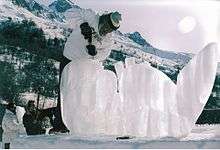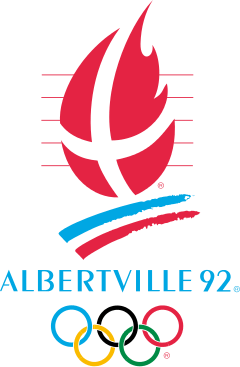1992 Winter Olympics
|
The emblem is the flag of Savoy region in the shape of the Olympic flame, dancing above stripes representing the flag of France. | |||
| Host city | Albertville, France | ||
|---|---|---|---|
| Motto | At the Peak of Performance (French: A la Pointe de la Performance) | ||
| Nations participating | 64 | ||
| Athletes participating | 1801 (1313 men, 488 women)[1] | ||
| Events | 57 in 6 sports (12 disciplines) | ||
| Opening ceremony | 8 February | ||
| Closing ceremony | 23 February | ||
| Officially opened by | President François Mitterrand | ||
| Athlete's Oath | Surya Bonaly | ||
| Judge's Oath | Pierre Bornat | ||
| Olympic Torch |
Michel Platini and François-Cyrille Grange | ||
| Stadium | Théâtre des Cérémonies | ||
| Winter: | |||
| |||
| Summer: | |||
| |||
|
The 1992 Winter Olympics, officially known as the XVI Olympic Winter Games (French: Les XVIes Jeux olympiques d'hiver), were a winter multi-sport event celebrated from 8 to 23 February 1992 in Albertville, France. They were the last Winter Olympics to be held the same year as the Summer Olympics,[2] and the first where the Winter Paralympics were held at the same site. Albertville was selected as host in 1986, beating Sofia, Falun, Lillehammer, Cortina d'Ampezzo, Anchorage and Berchtesgaden. The games were the third Winter Olympics held in France, after Chamonix in 1924 and Grenoble in 1968, and the fifth Olympics overall in the country.
Only some of the skating and the opening and closing ceremonies took place in Albertville, while the rest of the events took place in the villages of Courchevel, La Plagne, Les Arcs, Les Menuires, Les Saisies, Méribel, Pralognan-la-Vanoise, Tignes and Val d'Isère. Sixty-four nations with 1,801 athletes participated in the games, including the Unified Team which represented non-Baltic former Soviet republics. Germany participated as a unified team, while five newly independent European countries debuted, as did six "warm-weather" countries. Short track speed skating, moguls and women's biathlon made their debut as an Olympic sport. The games were the last Winter Games until 2014 to have demonstration sports, consisting of curling, aerials, ski ballet and speed skiing. It was the last Olympics to have an outdoor speed skating rink. The games were succeeded by the 1992 Winter Paralympics from 25 March to 1 April.
Norwegians won every male cross-country skiing race, with Bjørn Dæhlie and Vegard Ulvang both collecting three gold. Ski jumper Toni Nieminen, 16, became the youngest male gold medalist of a Winter Olympic event. Petra Kronberger won both the combined event and the slalom, while Bonnie Blair won both the 500 m and 1000 m speed skating events and Gunda Niemann took both of the longest races. Kim Kihoon earned gold medals in both men's short track events. Annelise Coberger of New Zealand won the southern hemisphere's first Winter Olympic medal—a silver in the women's slalom. Nicolas Bochatay was killed during a training session. Germany won the most medals and the most gold.
Host city selection

The vote to select the host city of the 1992 Winter Olympics was conducted on 17 October 1986, in Lausanne, Switzerland, at the 91st IOC Session. A record of seven different locales bid for these Games.[3]
| 1992 Winter Olympics bidding results[4] | |||||||
|---|---|---|---|---|---|---|---|
| City | Country | Round 1 | Round 2 | Round 3 | Round 4 | Round 5 (Run-off) | Round 6 |
| Albertville | | 19 | 26 | 29 | 42 | — | 51 |
| Sofia | | 25 | 25 | 28 | 24 | — | 25 |
| Falun | | 10 | 11 | 11 | 11 | 41 | 9 |
| Lillehammer | | 10 | 11 | 9 | 11 | 40 | — |
| Cortina d'Ampezzo | | 7 | 6 | 7 | — | — | — |
| Anchorage | | 7 | 5 | — | — | — | — |
| Berchtesgaden | | 6 | — | — | — | — | — |
Mascot
Magique (Magic) is the Olympic mascot of these Olympics and is a little imp in the shape of a star and a cube. It is created by Philippe Mairesse and was presented in 1989. His star shape symbolizes dreams and imagination. His colors come from the French flag, with a red hat and a blue costume.
Notable events
- Freestyle skiing event of moguls and short-track speedskating made their debuts as medal disciplines, as did women's biathlon.
- Norwegian skiers won every male cross-country skiing race. Bjørn Dæhlie and Vegard Ulvang each won three gold medals.
- Speedskater Bonnie Blair won both the 500 and 1,000 m events; Gunda Niemann took both of the longest races.
- Ski jumper Toni Nieminen, 16, became the youngest male gold medalist of a Winter Olympic event.
- Italian alpine skier Alberto Tomba won the Giant Slalom for the second time in a row.
- Austrian alpine skier Petra Kronberger won both the combined event and the slalom.
- Kim Kihoon earned gold medals in both men's short-track events.
- Annelise Coberger of New Zealand wins the southern hemisphere's first Winter Olympic medal—a silver in the women's slalom.
- Kristi Yamaguchi of the United States and Midori Ito of Japan became the first persons of Asian descent to win Olympic medals in figure skating.
- Midori Ito becomes the first woman to land a triple axel in Olympic competition.
- The Swiss speed skier Nicolas Bochatay died on the morning of the speed skiing finals, when he collided with a snow grooming vehicle while skiing on a public slope outside the racing area.
Sports
There were 57 events contested in 6 sports (12 disciplines). See the medal winners, ordered by sport:
|
|
Demonstration sports
This was the final time demonstration sports were included in the Winter Olympics programme.
- Curling – Competed for the first time since 1924. It became a regular discipline in 1998.
- Freestyle skiing – While moguls skiing was an official discipline, aerials and ski ballet were still considered as demonstration events.
- Speed skiing – A death occurred during a training session. The sport has not been included in the Winter Olympics program.
Participating nations
A total of 64 nations sent athletes to compete in these Games. With the collapse of the Soviet Union, six states formed a Unified Team, while the Baltic States of Estonia, Latvia and Lithuania had their own teams. Croatia and Slovenia, who were making their first appearance at the Winter Olympics, competed as independent nations after leaving Yugoslavia. The UN sanctions against Yugoslavia that saw them miss the 1992 Summer Olympics had yet to come into effect. The German team won most medals in the games, with a total of 10 gold medals, 10 silver and 6 bronze. It was the first time since the 1936 Winter Olympics that Germany competed with a unified team after the reunification.
Making their debuts were Algeria, Bermuda, Brazil, Honduras, Ireland and Swaziland (as well as the previously mentioned Croatia and Slovenia). It would also be the only appearance for both Honduras and Swaziland in Winter Olympics to date.
|
|
Venues
The 1992 Games are (as of today) the last ones where the speed skating venue was outdoors.
- Albertville
- Halle Olympique – Figure Skating and Short track speed skating
- L'anneau de vitesse – Speed skating
- Théâtre des Cérémonies – Ceremonies (opening/ closing)
- Les Arcs – Speed skiing
- Courchevel – Ski jumping and Nordic combined
- Les Ménuires – Alpine skiing (slalom men)
- Méribel – Alpine Skiing (women)
- Méribel Ice Palace – Ice hockey
- La Plagne – Bobsleigh and Luge
- Pralognan-la-Vanoise – Curling
- Les Saisies – Biathlon, Cross-country skiing
- Tignes – Freestyle skiing
- Val d'Isère – Alpine skiing (men combined, downhill, giant slalom, and super-giant slalom)
Medal table
(Host nation is highlighted.)
| Rank | Nation | Gold | Silver | Bronze | Total |
|---|---|---|---|---|---|
| 1 | | 10 | 10 | 6 | 26 |
| 2 | | 9 | 6 | 8 | 23 |
| 3 | | 9 | 6 | 5 | 20 |
| 4 | | 6 | 7 | 8 | 21 |
| 5 | | 5 | 4 | 2 | 11 |
| 6 | | 4 | 6 | 4 | 14 |
| 7 | | 3 | 5 | 1 | 9 |
| 8 | | 3 | 1 | 3 | 7 |
| 9 | | 2 | 3 | 2 | 7 |
| 10 | | 2 | 1 | 1 | 4 |
(¹ combined team with athletes from 6 nations of the Commonwealth of Independent States; team only appeared in these Winter Olympics)
See also
- 1992 Winter Paralympics
- 1992 Summer Paralympics
- 1992 Summer Olympics
- Olympic Games celebrated in France
Notes
- ↑ "The Olympic Winter Games Factsheet" (PDF). International Olympic Committee. Retrieved 5 August 2012.
- ↑ "Albertville 1992". www.olympic.org. Archived from the original on 28 March 2010. Retrieved 12 March 2010.
- ↑ IOC Vote History
- ↑ "Past Olympic host city election results". GamesBids. Archived from the original on 17 March 2011. Retrieved 17 March 2011.
External links
| Wikimedia Commons has media related to 1992 Winter Olympics. |
- "Albertville 1992". Olympic.org. International Olympic Committee.
- "Results and Medalists". Olympic.org. International Olympic Committee.
- Olympic Review – Official Results
- The program of the 1992 Albertville Winter Olympics
| Preceded by Calgary |
Winter Olympics Albertville XVI Olympic Winter Games (1992) |
Succeeded by Lillehammer |
